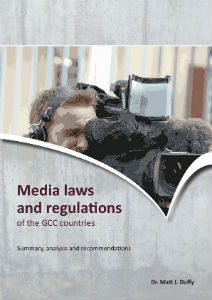 Thanks to the Internet, mobile phones, and social media, never before has so much expression been so public, so diverse, and so accessible—in the MENA* region or any other. The statistics[1] are by now not surprising:
Thanks to the Internet, mobile phones, and social media, never before has so much expression been so public, so diverse, and so accessible—in the MENA* region or any other. The statistics[1] are by now not surprising:
- 181 million or about 44 percent of people in Arab League states use the Internet, on par with the global internet penetration average of 39 percent
- Mobile penetration across the region is at 110 percent
- Arabic speakers are the 4th largest linguistic group on the Internet
- Between 2013 and 2014, the number of Facebook users in the region grew by almost 50 percent from about 55 million to 81 million
- Nearly 6 million Arab Twitter users, 40 percent of whom are in Saudi Arabia, send around 17 million tweets per day
- Women comprise about one-third of all participation on both Facebook and Twitter
Yet while the volume of free speech may have expanded exponentially in recent years, the boundaries of what constitutes permissible speech in many places have narrowed. Nowhere is this trend more evident on such a wide scale than in Arab countries, where in response to the growth in online expression, regimes are rapidly drafting and passing new legislation in an attempt to chill that speech.
None of this is news. The failure of Arab states to ensure the right to free expression and other democratic rights is well documented. “When they exist, bills of rights are a dead letter in the Middle East,”[2] writes legal scholar and human rights lawyer Chibli Mallat.
 Less attention is paid, however, to why this is so. Among the many sources consulted for this series, very few ask how we got here. When starting our research, we found ourselves asking, When thinking about how to expand free expression in the Arab world, where do we begin?
Less attention is paid, however, to why this is so. Among the many sources consulted for this series, very few ask how we got here. When starting our research, we found ourselves asking, When thinking about how to expand free expression in the Arab world, where do we begin?
It was a pair of sentences in the conclusion to Matt Duffy’s revealing 2013 report for the Doha Centre for Media Freedom, Media laws and regulation of the GCC countries, that prompted the question. Duffy wrote that restrictive media laws in the GCC may be the result of cultural factors, but “a better explanation for the Gulf countries [sic] approach to censorship may have more to do with their long-time reliance on Great Britain for advice. The United Kingdom often took a restrictive view of freedom of the press in its colonial affairs.”[3] It got us thinking.
The point isn’t to replace the demon of a rights-abusing regime with the demon of colonialism but there is value in recognizing that the frameworks governing rights in the Arab world come from somewhere—and that somewhere may be more familiar than we once thought. Embedded in that recognition is the hope to propel an advance in free expression by shifting the prevailing narrative from one that casts Arab legal frameworks as intrinsically backward or evil and Western ones as exemplary of good to one that deals much more honestly with the reasons these repressive frameworks emerged and are allowed to persist.
Not being historians or legal experts, we rely on two main sources—Chibli Mallat’s Introduction to Middle Eastern Law and Noah Feldman’s The Fall and Rise of the Islamic State—to lay down some broad strokes and launch this discussion. In the spirit of the Working Drafts series, we hope that others more knowledgable and thoughtful than ourselves will respond and contribute alternative perspectives and additional resources.
Alien Invasion

The introduction of Western normative frameworks to Middle Eastern law was as disruptive as if aliens had landed, says Chibli Mallat.
Legal frameworks in the Arab world derive from multiple legal traditions, including various aspects of Islamic law and the laws of the region’s many historical occupiers, including the Ottomans, Great Britain, France, and the U.S. Public law in the Middle East—the law that governs the relationship between a government and its citizens and, thus, constitutional law—didn’t exist in its current form before the arrival of the Europeans. In fact, the first Western-style constitution in the Arab region was promulgated by the Ottomans in 1876.
While today’s national legal systems do not compose a harmonized legal framework on a regional level, they do share common sources, experiences, approaches, and challenges, so much so that they have been grouped together by Mallat as part of a legal tradition he calls Middle Eastern law. More important, perhaps, than the source of the laws themselves was the way in which they came to the region—beginning with Napoleon’s invasion of Egypt in 1798—and the role they have played since. (Interestingly, it was also Napoleon who brought the first printing press to Egypt in 1798.) About this Mallat has written:
What Westerners brought to the Middle East in 1798 was not only military domination, but more lastingly dominant tools to read and understand the region. These tools were alien to Middle Easterners, not least the normative framework with which Western laws had infused their societies, and which they brought, by force or by persuasion, as the new normative framework for local societies. In the process, which lasted throughout that era and continues to date, the Middle Eastern legal tradition was shunted aside or asked to conform to the new legal spirit of the colonial masters. 1798 marks the symbolic beginning of the era of European, for which read colonial, law.[4]
Mallat leaves no room for nuance about the impact of this event, saying, “Had Martians disembarked on the coasts of Egypt, any law they conveyed would have had no more dramatic impact on the region.”[5]
This legal invasion, and the Ottoman Empire’s ill-executed attempt to adopt these frameworks as a response to competition from Europe during the Tanzimat ultimately led to the disruption of existing legal traditions through codification, or “the reduction to rules of the content of the shari’a.”[6] These written codes ultimately replaced the ulama (scholars), whose role as interpreters of Islamic law had been one of the most important checks on the power of the caliphs for a thousand years. While this codification “opened the possibility of secular government,” it also precipitated “the removal of the one meaningful check on executive authority [and] cleared the way for autocratic and absolute power.”[7] Even with the adoption of legislatures and constitutions and the judiciaries meant to uphold them—as we’ll see in the next post—the scholars’ check on executive power has never been compensated for.

‘File 8/11 Proscribed newspapers and seditious press articles’ from India Office Records and Private Papers, 1922. Courtesy Qatar Digital Library.
Other Lenses in the Looking Glass
The disruption of Islamic legal traditions by Western law was exacerbated by the contradictions inherent in the context in which it arrived. Colonial law by definition is a law of subjugation, so whatever the ideals outlined in the home country’s common law or other founding documents, colonial law frequently contradicts them. This is especially true with regard to free expression. As is well-known throughout the world and as Duffy alluded in the quotation above, French, British, and other colonial laws were used to control the press (and other democratic rights) as a means of controlling the people whose land they occupied and the urge to revolt.
The discovery of oil has also had a major impact on the contours of public law and democratic rights in the region in two main ways: First, in exchange for oil, the United States under FDR adopted “a policy of no questions asked about what happens inside Saudi Arabia, however abhorrent to democratic values.”[8] Second, and less commonly known, oil wealth all but negated the need for some Arab governments to be accountable to their citizens, because they didn’t have to rely on them to raise taxes. Both factors persist today.
Another groove in the record has been etched by the failure of international law as an equally applied standard with regard to Israel-Palestine, which Mallat assesses as the “absence of law as central arbiter of the conflict.”[9] Advocacy for sectarian states or sectarian governance within those states—Israel and Lebanon are two good examples—has also undermined the fundamental notion of being a citizen first and of being equal under the law.[10]
The sum of these effects, and possibly others, resulting from the upheaval created by the imposition of Western legal norms in the region will certainly color how legal and rights reform efforts of any kind are received.
Projecting Ahead
Again, raising the past is not meant to absolve Arab governments of their responsibilities to protect the rights of their citizens. Far from it. Rather looking backward is an attempt to reframe the questions we ask and the stories we tell in our advocacy, journalism, and policymaking about how we got here.
This is especially important, we think, as we face another major disruption to legal frameworks, this time from the spread of digital technologies and the new legislation and policies being generated worldwide to rein them in. We may not yet have the whole picture, but if we don’t wonder about where we’re coming from, we fear that we risk repeating the same mistakes.
In fact, we already see this happening with current trends in criminalizing expression in counterterrorism and cybersecurity laws, both in the region and beyond. We will discuss these trends further in later posts. Meanwhile, in our next installment, we’ll talk more about public law and constitutional review and how it relates to free expression. We hope to hear your thoughts.
*We use Arab, Middle East, MENA, WANA, and other monikers interchangeably, given that there’s no one term that satisfactorily encapsulates the diversity of the region. Suggestions welcome.
Notes
1. Unlinked stats are from the Sixth Arab Social Media Report. Other stats are from Internet World Stats.
2. Mallat, Chibli. Introduction to Middle Eastern Law. New York: Oxford University Press, 2007. p. 181.
3. Duffy, Matt J. Media laws and regulations in GCC countries. Doha: Doha Centre for Media Freedom, 2013. p. 64.
4. Ibid, p. 132.
5. Ibid.
6. Feldman, Noah. The Fall and Rise of the Islamic State. Princeton, New Jersey: Princeton University Press, 2008. p. 60.
7. Ibid.
8. Mallat, p. 133.
9. Ibid, p. 135.
10. Ibid, p. 136.

